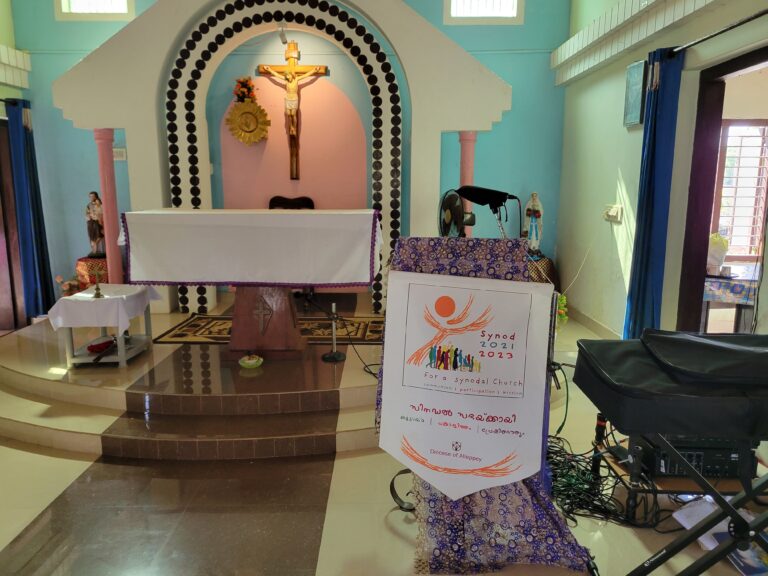‘Pope Francis invites me to talk to him; he is there to listen to me; I am immensely excited!’ – this was the first response of a lay woman in a village when she was introduced to the Diocesan Phase of the Synod for a Synodal Church, in October 2021.
Excitement, antipathy, confidence, apprehension, involvement, indifference, responsibility, reluctance – thus has passed the synodal discussion-discernment in India at the Diocesan, National, and Continental Phases. The Church in India, with eyes filled with hope and hearts filled with expectations, awaits the XVI General Assembly of the Synod in October 2023.
The tagline of the Synod, communion-participation-mission, prior to October 2021, might have meant to a lay person as ‘communion means Eucharist, participation means Sunday Mass, and mission means mission Sunday collection’.
But, now as we enter into the final phase of the Synod, we understand the depth of these words. During the discussion-discernment exercise the Church in India realised that the tagline of the Synod communion-participation-mission is in an intense conflict. Differentiation on account of gender, caste, language, rite, creed, power, wealth, and vocation comes heavily on ‘communion’ in the Church and in the society.
Deferment
Participation in ecclesial and pastoral structures is affected by deferment, a situation where the clergy and the lay faithful postpone saying, ‘we are not ready yet’. Mission is understood in a very narrow sense of being baptised and going to the church. This distorted notion of mission has made us ‘followers’ of Christian faith and not its partners.
Christianity has merely changed the way we worship but has failed to affect the way we live or conduct our lives in an ethical manner. We collectively hope that we will change our paths leaving aside our Building Bridges and Bridging Gaps differentiation, deferment, and distortion.
The Church in India, first, expects that all the delegates ‘talk with parrhesia’ at the Synod floor in Rome, instead of choosing to listen passively, for their entry to the Synod assembly is not a privilege ascribed to them, but a responsibility that is vested on them; that they do not hijack the floor on issues that concern a particular country or region or people.
Second, in India, Catholicism is often identified with the church buildings, structures, and institutions; and is associated with the people in authority: bishops, priests, men and women religious. The Church in India needs a ‘lay’ face to impact on today’s society. We wish that the Synod turns the table around to accommodate the lay faithful and creates space for the Church to permeate in the society through them.
Third, we want our local Church not as the kingdom of God, but as a household of God. We all will come to realise that we are a household each one having a role to play, with mutual respect, understanding, and acknowledgement.
We will address the issues that concern our household today such as religious fundamentalism, unleashed corruption, hate politics; and will not remain as passive observers to the hard-hitting realities.
Fourth, when we go through 15 worksheets that accompany Instrumentum Laboris we are happy that ‘the poor’ stand on the top of the list for discussion. However, we feel disappointed to see the dignity of women dealt under ‘co-responsibility in mission’.
We would rather have it discussed under ‘communion’ or ‘participation’. For, the women are to be accommodated for their own sake, not for the sake of mission; accommodating them for mission implies ‘using’ women, and will it not sub[1]vert synodality?
Fifth, ecumenism has a separate worksheet. This section could have included our reflection on the independent churches that mushroom across the world. They, through their fundamentalist interpretation of the Bible and narrow understanding of salvation, disrupt not only the faith of the Catholics, but also national peace and harmony.
Pathways
Sixth, relationship with other religions is an imperative today. But, we need to define pathways for it. For the dialogue among the Sacred Scriptures, the Church’s teaching on inspiration is a hurdle, and for integrating other religious elements, our orthodoxy in liturgy does not pave the way. Forums have to be created for inter-faith.
Seventh, at the end of the Synodal discussions, a Synod monitor consisting of the majority of the lay faithful must be established at the parish and diocesan levels in the local Church.
Eight, enough space must be given to spell out the challenges to synodality and the ways to overcome, instead of setting synodality as a farfetched ideal to reach.
Ninth, what we expect at the end of the General Assembly is not a post-synodal apostolic exhortation, but a post-synodal active experience. This active experience will make us journey from emotional contagion to empathic concern for the vulnerable in the Church and the society.
Tenth, we do not want the Synod to end as a romance. May it hurt us. From the sugar-coating we shall move to the bitter medicine. Failing will make this exercise a Francis syndrome in the Church. What we expect with hope is a Francis effect!
Fr Yesu Karunanidhi, a priest of the Archdiocese of Madurai, Tamil Nadu, India, is the national co-ordinator for the Synod of the Catholic Bishops’ Conference of India. He can be contacted at yesu@live.in



